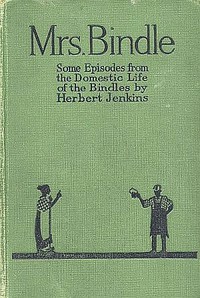Mrs. Bindle: Some Incidents from the Domestic Life of the Bindles, Jenkins [popular romance novels TXT] 📗

- Author: Jenkins
Book online «Mrs. Bindle: Some Incidents from the Domestic Life of the Bindles, Jenkins [popular romance novels TXT] 📗». Author Jenkins
Mrs. Bindle, however, seemed oblivious of the cares of this world in her anxiety not to make the journey to the next. As her breath became more constricted, so her alarm increased.
In her eyes there was a mute appeal that Bindle, for one, found it impossible to ignore. Instinctively he sensed what was troubling her, and he lost no opportunity of striving to reassure her by saying that she would be out and about again before she could say "Jack Robinson."
Still there lurked in her eyes a Great Fear. She had never before had bronchitis, and the difficulty she experienced in breathing seemed to her morbidly suggestive of approaching death. Although she had never seen anyone die, she had in her own mind associated death with a terrible struggle for breath.
Once when Bindle suggested that she might like to see Mr. MacFie, the minister of the Alton Road Chapel, Mrs. Bindle turned upon him such an agonised look that he instinctively shrank back.
"Might-a-been Ole Nick 'isself," he later confided to Mrs. Hearty, "and me a-thinkin' to please 'er."
"She's afraid o' dying, Joe," wheezed Mrs. Hearty "Alf was just the same when 'e 'ad the flu."
Bindle spent money with the recklessness of a desperate man. He bought strange and inappropriate foods in the hope that they would tempt Mrs. Bindle's appetite. No matter where his work led him, he was always on the look out for some dainty, which he would purchase and carry home in triumph to Mrs. Hearty.[Pg 256]
"You ain't 'alf a joke, Joe," she wheezed one evening, sinking down upon a chair and proceeding to heave and billow with suppressed laughter.
Bindle looked lugubriously at the yellow pie-dish into which he had just emptied about a quart of whelks, purchased in the Mile End Road.
"Ain't they good for bronchitis?" he enquired with a crestfallen look.
"Last night it was pig's feet," gasped Mrs. Hearty, "and the night before saveloys," and she proceeded to beat her chest with a grubby fist.
After that, Bindle had fallen back upon less debatable things. He had purchased illustrated papers, flowers, a quarter of a pound of chocolate creams, which had become a little wilted, owing to the crowded state of the tramcar in which he had returned home that night.
During those anxious days, he collected a strange assortment of articles, perishable and otherwise. The thing he could not do was to go home without some token of his solicitude.
One evening he acquired a vividly coloured oleograph in a gilt frame, which depicted a yawning grave, whilst in the distance an angel was to be seen carrying a very material-looking spirit to heaven.
Mrs. Bindle's reception of the gift was a wild look of terror, followed by a fit of coughing that frightened Bindle almost as much as it did her.
"Funny," he remarked later as he carried the picture out of the room. "I thought she'd 'ave liked an angel."
It was Bindle who eventually solved the problem of[Pg 257] how to convey comfort to Mrs. Bindle's distraught spirit.
One evening he accompanied the doctor to her room. After the customary questions and answers between doctor and patient, Bindle suddenly burst out.
"I got a bet on with the doctor, Lizzie."
From an anxious contemplation of the doctor's face, where she had been striving to read the worst, Mrs. Bindle turned her eyes to Bindle's cheery countenance.
"'E's bet me a quid you'll be cookin' my dinner this day week," he announced.
The effect of the announcement on Mrs. Bindle was startling. A new light sprang into her eyes, her cheeks became faintly pink as she turned to the doctor a look of interrogation.
"It's true, Mrs. Bindle, and your husband's going to lose, that is if you're careful and don't take a chill."
Within ten minutes Mrs. Bindle had fallen into a deep sleep, having first ordered Bindle to put another blanket on the bed—she was going to take no risks.
"The first time I ever knowed Mrs. B. 'ear me talk about bettin' without callin' me a 'eathen," remarked Bindle, as he saw the doctor out. "Wonders'll never cease," he murmured, as he returned to the kitchen. "One o' these days she'll be askin' me to put a shillin' on both ways. Funny things, women!"[Pg 258]
II
Bindle's plot with the doctor did more to expedite Mrs. Bindle's recovery than all the care that had been lavished upon her. From the hour she awakened from a long and refreshing sleep, she began to manifest interest in her surroundings. Her appetite improved and her sense of smell became more acute, so that Bindle had to select for his dishes materials giving out a less pungent odour.
He took the additional precaution of doing his cooking with the window and scullery-door open to their fullest extent.
Mrs. Bindle, on her part, took pleasure in planning the meals she imagined Mrs. Coppen was cooking. She had not been told that the charwoman was in prison for assaulting a policeman with a gin bottle.
"You'll 'ave to look out now, Joe," admonished Mrs. Hearty on one occasion as she entered the kitchen and gazed down at the table upon which Bindle was gathering together materials for what he described as a "top 'ole stoo." "If Lizzie was to catch you making all this mess she——" Mrs. Hearty finished in a series of wheezes.
One evening, when Bindle's menu consisted of corned-beef, piccalilli and beer, to be followed by pancakes of his own making, the blow fell.
The corned beef, piccalilli and beer were excellent and he had enjoyed them; but the pancakes were to[Pg 259] be his chef d'[oe]uvre. His main object in selecting pancakes was, as he explained to Mrs. Hearty, "that they don't stink while cookin'."
From his sister-in-law he had obtained a general idea of how to proceed. She had even gone so far as to assist in mixing the batter.
The fat was bubbling merrily in the frying-pan as he poured in sufficient liquid for at least three pancakes.
"You ain't got much to learn about cookin', old cock," he muttered, as he watched the fat bubble darkly round the cream-coloured batter.
After a lapse of some five minutes he decided that the underside was sufficiently done. Then came the problem of how to turn the pancake. He had heard that expert cooks could toss them in such a way that they fell into the pan again on the reverse side; but he was too wise to take such a risk, particularly as the upper portion of the pancake was still in a liquid state.
He determined upon more cautious means of achieving his object. With the aid of a tablespoon and a fish-slice, he managed to get the pancake reversed. It is true that it had a crumpled appearance, and a considerable portion of the loose batter had fallen on to the stove; still he regarded it as an achievement.
Just as he was contemplating the turning of the pancake on to a plate, a knock came at the front-door. On answering it, Bindle found a butcher's boy, who insisted that earlier in the day he had left a pound of beef-steak at No. 7, instead of at No. 17. The lad[Pg 260] was confident, and refused to accept Bindle's assurance that he had neither seen nor heard of the missing meat.
The argument waxed fierce and eventually developed into personalities, mainly from the butcher-boy.
Suddenly Bindle remembered his pancake. Banging the door in the lad's face, he dashed along the passage and opened the kitchen door. For a second he stood appalled, the pancake seemed to have eaten up every scrap of oxygen the room contained, and in its place had sent forth a suffocating smell of burning.
Realising that in swift action alone lay his salvation, Bindle dashed across the room, opened the door leading to the scullery and then the scullery door itself. He threw up the window and, with water streaming from his eyes, approached the stove. A blackened ruin was all that remained of his pancake.
Picking up the frying-pan he carried it over to the sink, where he stood regarding the charred mass. Suddenly he recollected that he had left open the kitchen-door leading into the passage. Dropping the frying-pan, he made a dash to close it; but he was too late. There, with her shoulders encased in a red flannel petticoat, stood Mrs. Bindle.
"My Gawd!" he muttered tragically.
For nearly a minute she stood as if turned to stone. Then without a word she closed the door behind her, walked to the centre of the room, and stood absorbing the scene of ruin and desolation about her, Bindle backing into the furthest corner.
She regarded the stove, generously flaked with the[Pg 261] overflow of Bindle's culinary enthusiasm, glanced up at the discoloured dish-covers over the mantelpiece, the brightness of which had always been her special pride.
On to the dresser her eye wandered, and was met by a riot of dirty dishes and plates, salmon tins, empty beer bottles, crusts of bread, reinforced by an old boot.
The kitchen-table held her attention for fully half a minute. The torn newspaper covering it was stained to every shade of black and brown and grey, the whole being composed by a large yellow splotch, where a cup of very liquid mustard had come to grief.
Upon this informal tablecloth was strewn a medley of unwashed plates, knives and forks, bread-crumbs, potato-peelings and fish-bones.
Having gazed her fill, and still ominously silent, she proceeded to make a thorough tour of inspection, Bindle watching her with distended eyes, fear clutching at his heart.
At the sink she stood for some seconds steadfastly regarding Bindle's pancake. Her lips had now entirely disappeared.
The crisis came when she opened the dresser drawer and found the pie-dish and plate he had broken, but had forgotten to take away. Screwing up the packet again, she turned swiftly and hurled it at him with all her strength.
Wholly unprepared, Bindle made a vain effort to dodge; but the package got him on the side of the head, and a red line above his ear showed that Mrs. Bindle had drawn first blood.[Pg 262]
"You fiend!" she cried. "Oh, you——!" and dropping into the chair by the table she collapsed.
Soon the kitchen was ringing with the sounds of her hysterical laughter. Bindle watched her like one hypnotised.
As if to save his reason, a knock came at the outer door. He side-stepped swiftly and made a dash for the door giving access to the hall. A moment later he was gazing with relief at Mrs. Hearty's pale blue tam o' shanter.
"'Ow is she, Joe?" she wheezed.
Then as he stepped aside to allow Mrs. Hearty to precede him into the kitchen, Bindle found voice. "I think she's better," he mumbled.[Pg 263]
CHAPTER XII MRS. BINDLE BREAKS AN ARMISTICEI
"Pleasant company, you are," snapped Mrs. Bindle, as she made an onslaught upon the kitchen fire, jabbing it viciously with a short steel poker.
Bindle looked up from the newspaper he was reading. It was the third attack upon the kitchen fire within the space of five minutes, and he recognised the portents—a storm was brewing.
"I might as well be on a desert island for all the company you are," she continued. "Here am I alone all day long with no one to speak to, and when you come home you just sit reading the horse-racing news in the paper."
"Wot jer like to talk about?" he enquired, allowing the paper to drop to the floor opposite him.
She sniffed angrily and threw the poker into the ash-pan.
"I wasn't readin' about racin'," he continued pacifically. "I was jest readin' about a cove wot went orf with another cove's missis, 'is best overcoat and two chickens."[Pg 264]
"Stop it!" She stood over him, her lips compressed, her eyes hard and steely, as if meditating violence, then, turning suddenly, she walked swiftly across to the dresser and pulled out the left-hand drawer. Taking from it her bonnet, she put it on her head and proceeded to tie the strings beneath her chin.
From behind the kitchen door she unhooked a brown mackintosh, into which she struggled.
"Goin' out?" he enquired.
"Yes," she replied, as she tore open the door, "and perhaps I'll never come back again," and with a bang that shook the house she was gone.
She took a tram to Hammersmith on her way to see her niece, Millie Dixon. She was angry; the day had been one of continual annoyances and vexations. Entering the car she buried her elbows deep into the redundant figure of a woman who was also endeavouring to enter.
Once inside, the woman began to inform the car what she thought of "scraggy 'Uns with faces like a drop of vinegar on the edge of a knife."
"That's the way you gets cancer," she continued, as she stroked the left side of her ample bust. "People with elbows like that should 'ave 'em padded," and Mrs. Bindle





Comments (0)